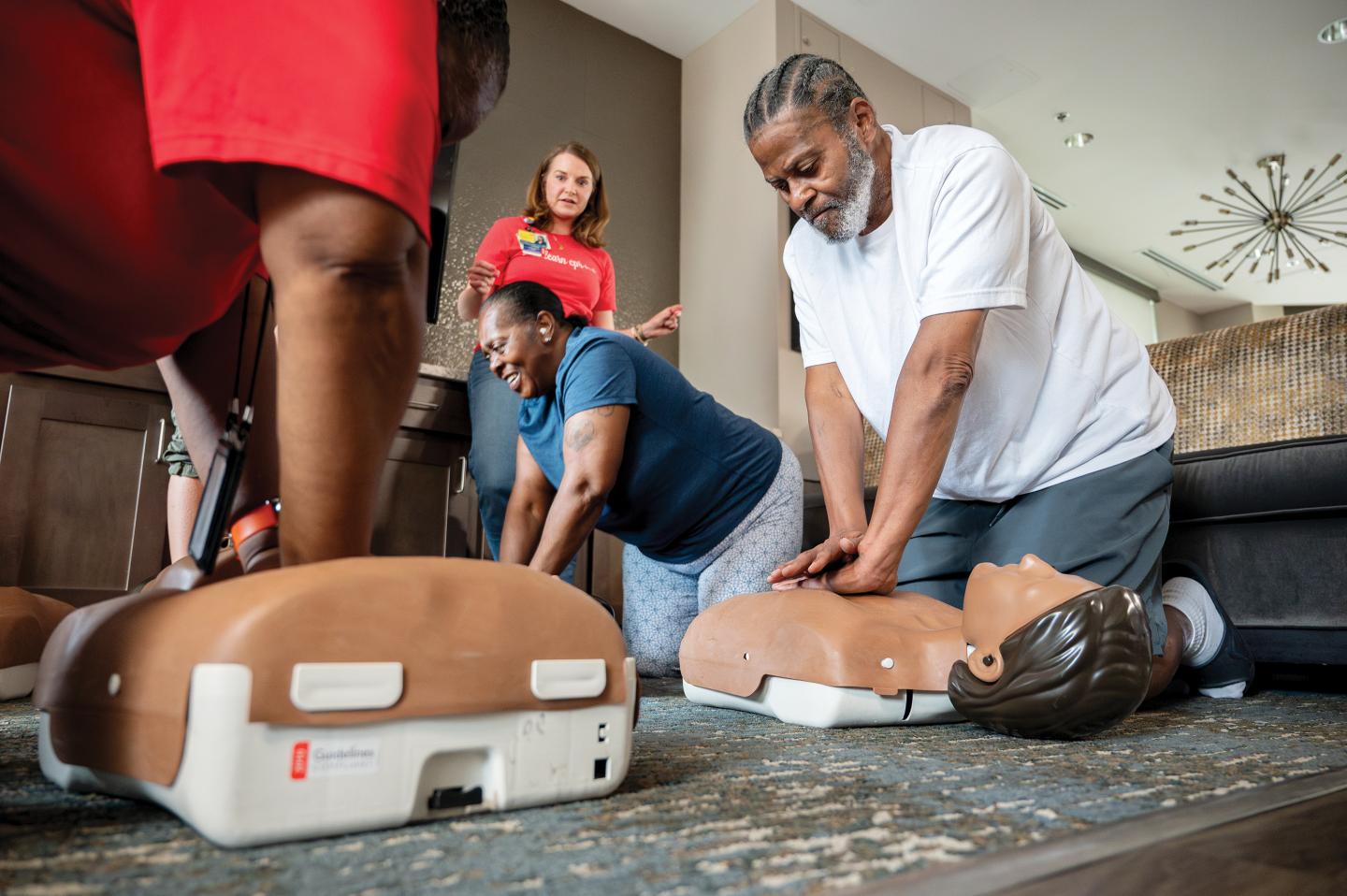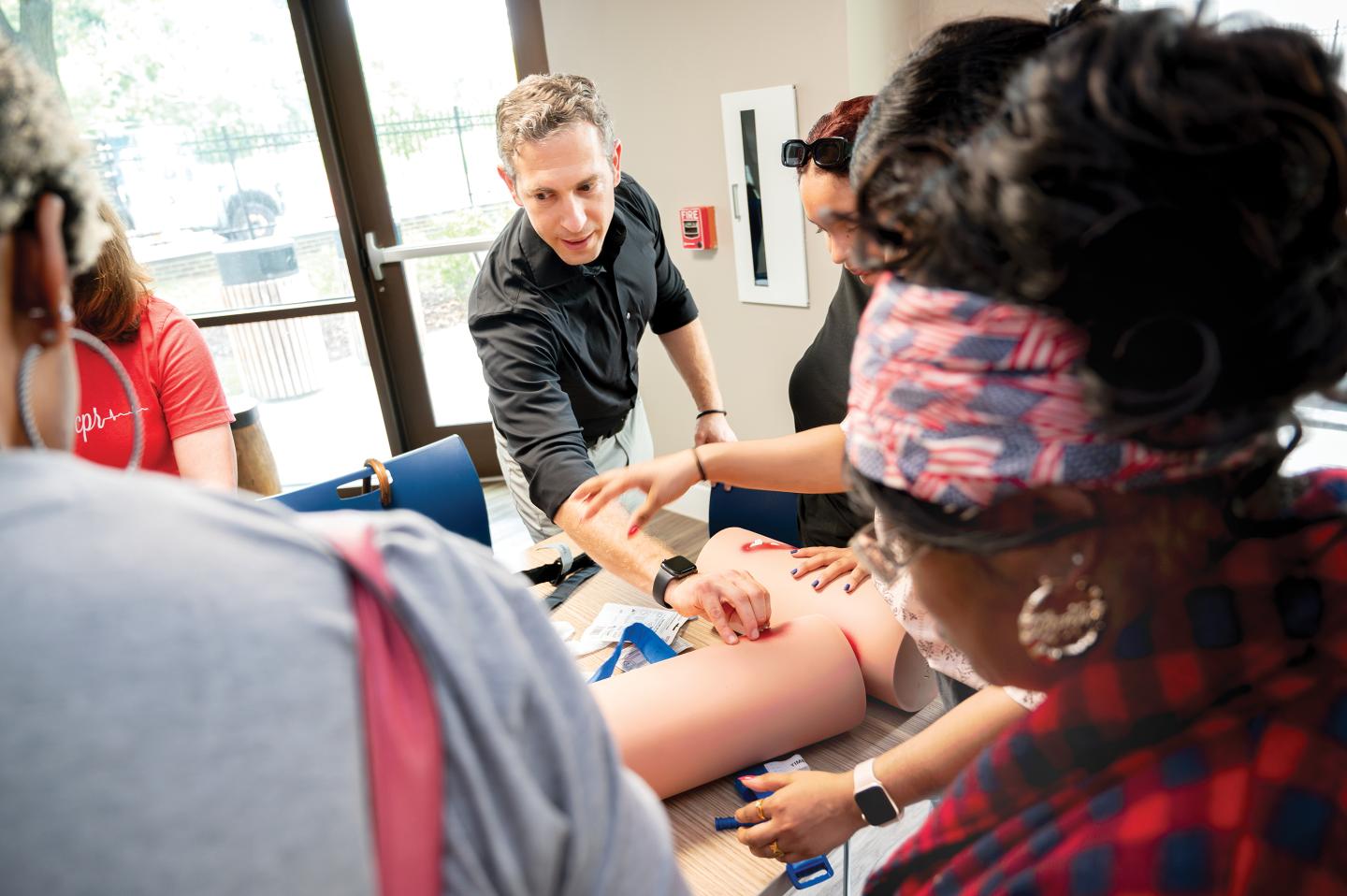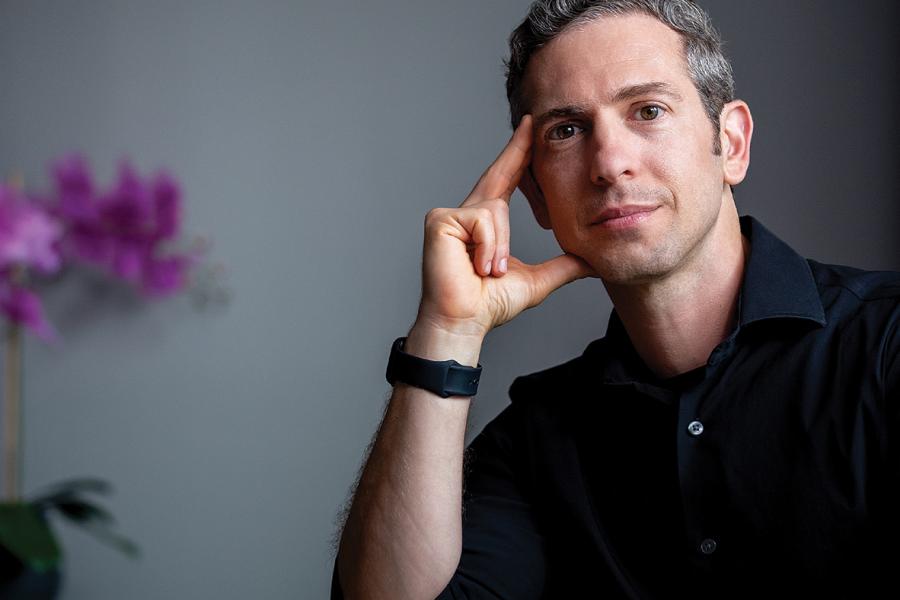Every Friday at 11 a.m., wherever he is in the world, Panagis Galiatsatos turns on his computer and Zooms into a postpandemic version of rounds. The 39-year-old pulmonologist and critical care specialist has presented papers at major medical conferences, done TED Talks, and recently talked with 10,000 medical students in Boston. But Friday appointments with Baltimore pastors, community leaders, and his fellow physicians from Johns Hopkins are ones he never misses. This is his time to address community concerns directly, thwart medical misinformation, and connect potential patients to pathways to improve their health.
The questions come rapid-fire, most of them having nothing to do with the smoking cessation programs that Galiatsatos runs out of his Johns Hopkins Bayview Medical Center office.
Can sleep apnea be genetic? (Yes, he injects, so definitely talk about it at the next family dinner.)
Should I take a fiber supplement? (Yes, but don't let it replace the fiber you need from healthy food like beans.)
The weekly Zoom round-robin is just one facet of Medicine for the Greater Good, a group Galiatsatos co-founded in 2013 to better reach the Baltimore residents most in need of care. Baltimore, a city with one of the world's best hospitals, also has some of the worst health outcomes. City residents suffer from high rates of asthma, emphysema, and other breathing diseases. Too many can't access the world-renowned care that's so close to home.
Galiatsatos, sipping strong Greek coffee he's brewed himself, draws energy from each exchange with the screen squares. "I love these questions!" he enthuses. "Keep 'em coming!" He closes the meeting by inviting everyone to email him if they think of anything else. In August, he reminds everyone, he's out of town, so anyone is welcome to come by his home in Pikesville to pick figs from his tree.

Image caption: Local residents take part in a community-based CPR workshop.
Image credit: Marshall Clarke
Then he lets them know he'll be on CBS This Morning on Sunday to discuss mental health, and at New Metropolitan Baptist on McCullough Street in a couple of weeks for a talk on prostate cancer. At that, the Rev. Angela Burden smiles. Both a public health nurse and one of New Metropolitan's pastors, Burden looks forward to Galiatsatos' talk capping off several weeks of programming aimed at men's health.
"I've gotten to meet him, I've seen his heart," she says later. "Even when you're on Zoom with him, he sees you, he feels you."
What began with Galiatsatos reaching out to his childhood church in Highlandtown to promote cancer screenings has grown into a program that has trained more than 500 Hopkins residents in public speaking, outreach, and more effective community medicine. He's not working alone: His co-founders, Colleen Christmas and Ariel Green, and co-directors, Thomas Cudjoe and Erica Johnson, are also on the team with Galiatsatos (pronounced Gal-its-ah-tos). Since the COVID pandemic began, he and colleagues have held Friday Zooms with faith leaders from Orthodox Jewish to Southern Baptist. An additional 740 people on an email listserv get a recording.
This kind of outreach hearkens back to the principles that William Osler, Hopkins' first professor of medicine and the father of the grand rounds tradition, laid out when he arrived in a gritty port city in 1889: "It is much more important to know what sort of a patient has a disease than what sort of a disease a patient has."
And Galiatsatos, a proud Greek American known as Dr. G, understands the kinds of patients predisposed to getting sick in Baltimore. They are lower-income residents, or immigrants who don't speak English, or renters in apartment buildings with poor air circulation, residents who don't have reliable bus service to reach pharmacies and grocery stores. They are people without insurance, people without doctors they trust. He knows them because they are his old neighbors, fellow parishioners, friends. And he knows that if he can't reach them, it will only widen the chasm between the health system and the neighborhoods that surround it.
"We have to understand [environment] is going to greatly influence the patient's health. I can give them all the inhalers in the world, but if they're living in a housing unit with a ton of secondhand smoke, it's not going to go well. Or maybe I'm prescribing them a statin, but they're living in a food desert where their closest proximity to some version of a nutritious meal is a ton of processed food," Galiatsatos says. "Unless you understand who they are, where they live, what their identities are, it's going to be really hard to have this field of [traditional] medicine and health be seen as some solution to them."
Galiatsatos' success was far from inevitable.
His mother, a seamstress, was a Greek immigrant who had fled that nation's civil war of the late 1940s. His father, a painter, was only a child when his grandfather died fighting the Nazis. Neither parent spoke English. Hopkins turned Galiatsatos down when he applied for college; he went to Temple University instead. He was the first man in his family to attend college. And Hopkins rejected him for medical school, so he ended up enrolling at the University of Maryland. Bayview accepted him as a resident, fulfilling a dream that began when he could see the hospital from his modest row house in Greektown.
Initially, Galiatsatos thought his focus would be lab research. He would do community engagement on the side. Most of the doctors involved in outreach were primary care physicians, and Galiatsatos did not want to give up on treating lung conditions or working with patients in the hospital. He wanted to be a critical care specialist who worked directly with the community. There didn't seem to be a path for that, let alone the types of recognition that young doctors crave. There is no Nobel Prize, no Fields Medal, for teaching a CPR class or warning about the dangers of vaping.
Those feelings changed just three months into his intern year, when his home parish, St. Nicholas Greek Orthodox Church of Baltimore City, invited him to give a talk after the worship service on colon cancer. As he recounts in his autobiography Medicine for the Greater Good, forthcoming from Johns Hopkins University Press, Galiatsatos was a jumble of nerves. He readied his PowerPoint, then abandoned the podium for the pews and spoke from the heart to the community that had raised him. He felt they listened, and so did he. He would come back, again, and learn that members of the church had heeded his words; one, Mr. Kostas, got a screening and had several polyps removed.
Eventually, word of the successful talk filtered back to Richard Bennett, then president of Bayview. He'd been talking with William Hale, a Florida psychologist who had started a program training faith leaders to communicate with parishioners about health issues and connect them with doctors and nurses who could check blood pressure, offer mammograms, and enroll them in smoking cessation programs. Bennett called the young resident in and told him to chat with Hale. Galiatsatos and Hale met for a meal at the Red Star restaurant in Fell's Point and clicked.
"He just seemed to immediately catch on to the importance of working in the community, working beyond the walls of the hospital, and that is in part because he is a son of Baltimore, the son of immigrants, and he loves this community," says Hale, who recently retired as special adviser to the Bayview president. "He understood how often they didn't have the information they needed to stay healthy. He had seen it, in friends of his family, that in some cases they got to the doctor's office too late."
In Hale, Galiatsatos saw a way to have one foot in the hospital and another in the community. With time, he took on more projects. Feet everywhere. Dr. G has published more than 100 papers, mentored scores of residents, and helped many first-generation students like himself. Still recognized on the streets of Greektown, he has a following well beyond the close-knit alleys and row houses in the shadow of Bayview Hospital. He's known around the world, especially in Greece, where he frequently appears on television to talk about COVID and mental health. (He speaks the language fluently.)
He's the co-author, with Hale and Bennett, of Building Healthy Communities Through Medical- Religious Partnerships, a book about faith-based outreach in medicine. He's a fellow at the Johns Hopkins Center for Innovative Medicine, which another mentor, David Hellmann, runs. Many weekends, he is at churches, synagogues, and mosques around Baltimore, talking about checking blood pressure, cancer screening, nutrition, depression, and whatever else the community sees as important. In his office, under a Greek flag, are framed articles about his work.
In his spare time, he gardens, cooks, and bakes; his mother's recipe for braided cookies, called kuolourakia, is a favorite. His wife, Tracy Friedlander, is an assistant professor of physical medicine and rehabilitation at Johns Hopkins, and they have two daughters, Anna and Stella. Friedlander says her husband has always been industrious. Galiatsatos agrees. "The best way for me to finish a task is to give me another task to do."
Both Hale and Galiatsatos arrived at Hopkins in 2010 during a time of high tension between the hospital and community. Of note, their arrival coincided with the publication of The Immortal Life of Henrietta Lacks, a bestselling book documenting how the hospital took the cells of a young Black mother in 1951 and distributed them widely for use in medical research. Lacks died of cervical cancer in the hospital; the HeLa cells live on today, yielding cures and treatments for all manner of diseases. The Lacks descendants recently received a historic settlement from the drug company Thermo Fisher Scientific for its use of HeLa cells.
The hospital that began when Quaker businessman Johns Hopkins donated his fortune to create an institution that served the whole community has not always lived up to those lofty goals in the 134 years since, Hellmann says. Some residents recall the years when Hopkins had separated Black and white blood in its blood bank; others bristle at the institution's growth and the displacement of residents. "We have really wonderful examples of people who have championed justice, even if we, as an institution, have not always lived up to those principles," Hellmann says. "But Hopkins has wonderful principles, and the advantage of those is that you have a compass that tells you when you are off course."
Galiatsatos is an example of a doctor with such a compass. Now, Galiatsatos is leading his residents on the same path. Cat Ahlberg, a thirdyear pulmonology resident, came to Bayview from Case Western Reserve University specifically to work with Galiatsatos. When Ahlberg interviewed at other schools, program leaders told the Californian that she had to choose between social medicine or critical care medicine.
"At Bayview, they said, 'Not only do they go together, but we have someone who does it,'" she says. "And he's really pushed that forward, saying it doesn't matter what specialty you're in, you can care about these things and make an impact."
As part of her emphasis on community care, Ahlberg and her husband moved to McElderry Park, an East Baltimore neighborhood that health officials have designated as the hottest in Baltimore owing to the lack of trees and dense housing. That extreme heat exacerbates many conditions, including asthma and COPD. Ahlberg knows her neighbors; she's even treated a few. One night, she stabilized a gunshot victim as she and her neighbors waited 20 minutes for an ambulance. She's convinced at least one to stop smoking.
"You're actually understanding the people who live here, and that means you can take care of them better," she says. And in that regard, she adds, Galiatsatos has been a great mentor. "Patients are not problems—they're people. He reinforces that."
For all those Galiatsatos has reached, it is the one who almost got away that reminds him of how much work is left to do.
Prior to the pandemic, Galiatsatos met Hassan Amin, an imam at the Mosque Masjid El Ihsan in West Baltimore. Amin was a chaplain at Johns Hopkins and a lay health educator, and he'd come to Galiatsatos for help resettling an influx of Syrian refugees in the neighborhood around the mosque. Many needed medications, critical care, and therapies. During the pandemic, Amin was adamant about getting his congregants vaccinated. The two worked together at the mosque several times on CPR training, blood pressure monitoring, smoking cessation, and COVID protections. They developed a close friendship.
In December 2020, Amin's wife called Galiatsatos. Her husband was sick, she said, and he wouldn't go to the hospital. Could Dr. G help? Galiatsatos called his friend and implored him to go to Bayview. He did. Galiatsatos was his attending physician. His lungs were weak, his body failing. He went into a medically induced coma. He spent weeks at a rehab facility, and many more recovering at home. Amin says he is just now nearly back to normal.

Image caption: Galiatsatos uses props to instruct community residents on how to stop a bleed
Image credit: Marshall Clarke
Asked why he didn't go to the hospital, the imam replies: "I'm not a hospital guy and getting sick was new to me. For me, it's like, I can take care of this myself. I can take medicine. I can take Theraflu. But I am glad I finally went." He is certain that Galiatsatos saved his life. "He became part of my family," Amin says. "My wife can call him anytime."
Galiatsatos will always be grateful he made the call. "He has saved more lives than any physician, pushing people to get vaccinated. He is easily one of the best human beings I know," Galiatsatos says of the imam. "If his wife did not call me, I am convinced he would have died. And that is a constant reminder to me of what medicine can and cannot do."
There is a refrain that Galiatsatos repeats often, whether speaking with Greek elders or West Baltimore teenagers. No one likes to be a patient. So, as Osler says, treat the person as a person and you will reach the root of the disease.
"Medicine is so odd because we want to treat the patient. But that disease isn't in a vacuum. Right? It's part of this bigger picture of them and their environment," he says. "We're not going to make any changes unless we know who these individuals are and how aligning them with our goals makes an impact on their life."
At New Metropolitan Baptist, as the service ends and the crowds in their finery file out the exits, a group of men remains for the Medicine for the Greater Good prostate cancer talk. Olivia Stanford, a Hopkins health coordinator whom Galiatsatos trained, explains the risk factors for this common cancer: smoking, obesity, a sedentary life. Black men, she tells them, have higher rates than other groups. Some will die from it, but many others will die with it from other diseases if the cancer grows slowly. The 40 Black men in the room nod; several are survivors, and one worries that the Agent Orange he was exposed to in Vietnam could make him sick one day, too.
As Stanford hands out pamphlets and reminds the men to follow up with her, Burden thanks the men for their "living testimonies" and praises Galiatsatos and his team for showing up. Those 40 men, she said, will tell their friends, and maybe they will tell their friends, and maybe those words on a Sunday will save lives. And all because of a Hopkins doctor she befriended over Zoom who asked what he could do.
Posted in Community








